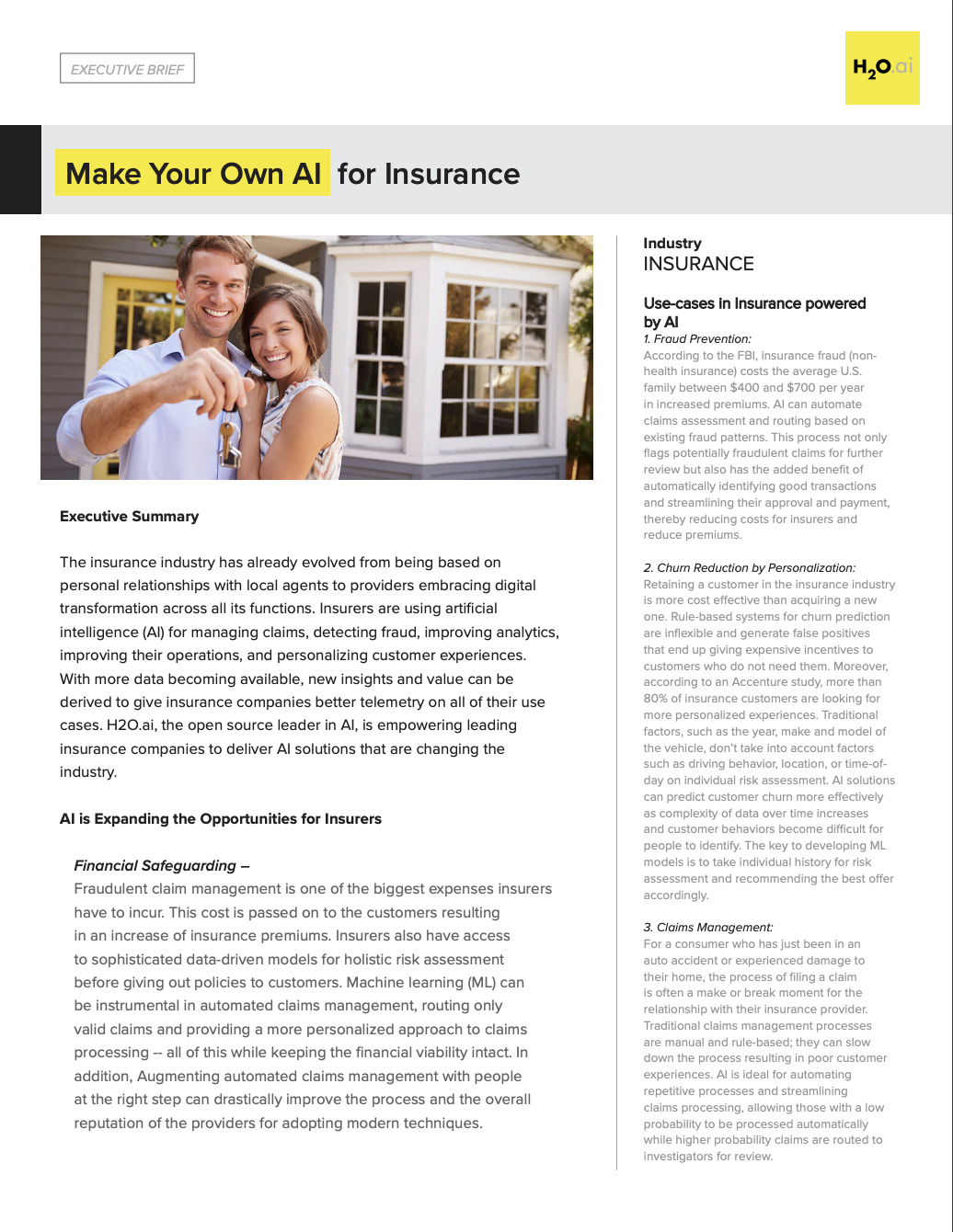Make Your Own AI for Insurance
AI is Expanding the Opportunities for Insurers
Executive Summary
The insurance industry has already evolved from being based on personal relationships with local agents to providers embracing digital transformation across all its functions. Insurers are using artificial intelligence (AI) for managing claims, detecting fraud, improving analytics, improving their operations, and personalizing customer experiences. With more data becoming available, new insights and value can be
derived to give insurance companies better telemetry on all of their use cases. H2O.ai, the open source leader in AI, is empowering leading insurance companies to deliver AI solutions that are changing the industry.


AI is Expanding the Opportunities for Insurers
Financial Safeguarding –
Fraudulent claim management is one of the biggest expenses insurers have to incur. This cost is passed on to the customers resulting in an increase of insurance premiums. Insurers also have access to sophisticated data-driven models for holistic risk assessment before giving out policies to customers. Machine learning (ML) can be instrumental in automated claims management, routing only valid claims and providing a more personalized approach to claims processing — all of this while keeping the financial viability intact. In addition, Augmenting automated claims management with people at the right step can drastically improve the process and the overall reputation of the providers for adopting modern techniques.
Customer Experience –
Continuously acquiring new customers and reducing the churn of existing customers are usually the top priority for insurers. Customers are constantly looking for personalized rates and product bundles. Moreover, as customers’ life situations evolve over the years, there is an opportunity to make better offers available to customers that fit their individual situations. AI solutions such as recommendation engines and customer 360 can combine historical buying patterns, demographic data, product offers, personal preferences and location data to provide such suggestions.
Operational Excellence –
Improving end-to-end operations is as important for insurance providers as improving customer experience. AI-based intelligent assistants for call centers, fast and accurate backend processing of claims, developing new ways of leveraging data for better services are all examples of how an AI-first strategy can make an immediate impact on an insurance provider’s operations.
AI is Expanding the Opportunities for Insurers
Why H2O.ai for Insurance
H2O.ai offers an award-winning automatic machine learning platform in Driverless AI and has been recognized as an industry leader in the Forrester New WaveTM: Automation-Focused Machine Learning Solutions, Q2 2019. H2O, open source, is already being used by hundreds of thousands of data scientists and is deployed at over 18,000 organizations across nearly every industry.
H2O Driverless AI empowers data scientists, data engineers, mathematicians, statisticians and domain scientists to work on projects faster and more efficiently by using automation to accomplish tasks that can take months and can now be reduced to hours or minutes by delivering automatic feature engineering, model validation, model tuning, model selection and deployment, machine learning interpretability, timeseries, NLP, automatic pipeline generation for model scoring and automatic documentation with reason codes, and now bring your own recipes and model operations and administration.
The new innovations and capabilities will enable customers to accelerate their AI transformations in the Insurance industry.
1. Fraud Prevention:
According to the FBI, insurance fraud (nonhealth insurance) costs the average U.S. family between $400 and $700 per year in increased premiums. AI can automate claims assessment and routing based on existing fraud patterns. This process not only flags potentially fraudulent claims for further review but also has the added benefit of automatically identifying good transactions and streamlining their approval and payment, thereby reducing costs for insurers and reduce premiums.
2. Churn Reduction by Personalization:
Retaining a customer in the insurance industry is more cost effective than acquiring a new one. Rule-based systems for churn prediction are inflexible and generate false positives that end up giving expensive incentives to customers who do not need them. Moreover, according to an Accenture study, more than 80% of insurance customers are looking for more personalized experiences. Traditional factors, such as the year, make and model of the vehicle, don’t take into account factors such as driving behavior, location, or time-ofday on individual risk assessment. AI solutions can predict customer churn more effectively as complexity of data over time increases and customer behaviors become difficult for people to identify. The key to developing ML models is to take individual history for risk assessment and recommending the best offer accordingly.
3. Claims Management:
For a consumer who has just been in an auto accident or experienced damage to their home, the process of filing a claim is often a make or break moment for the relationship with their insurance provider. Traditional claims management processes are manual and rule-based; they can slow down the process resulting in poor customer experiences. AI is ideal for automating repetitive processes and streamlining claims processing, allowing those with a low probability to be processed automatically while higher probability claims are routed to investigators for review.
Customer Case Studies
- Progressive, one of the largest provider
- Nationwide, one of the largest and most
Progressive has collected customer driving data for more than 20 years. With the introduction of the snapshot telematics devices, the company has accumulated over 14 billion miles of customer driving data to understand customer behavior and provide personalized rates. The analytics group at Progressive found that legacy analytics could not keep up with business needs, and decided to use ML to accelerate time-toinsight using predictive models. Using H2O, the data team at Progressive Insurance is able to create models for customer churn, billing, fraud detection, and threat analysis in much less time and address more business problems with the same team size.
The centralized data science team at Nationwide rapidly explore data with feature engineering and are able to quickly prototype new models related to customer churn, customer retention, call routing, risk segmentation, business segmentation, fraud, underwriting, customer expansion, and customer 360 in either R or Python. They have built a unique model factory with over 500 thousand models and scored 25 billion models in the last decade monitoring all parts of their business. Working with H2O.ai platforms allows them to quickly provide stable, statistically unbiased models that can be trusted in production environments.
Win with AI – Get Started Today
AI is critical to success in the insurance industry. Driverless AI enables insurers to improve personalization of policies, customer churn reduction, fraudulent claims detection and claim processing.





